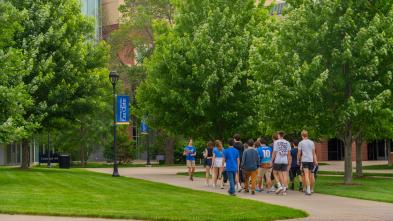
Chancellor’s Blog: Workforce Innovation Grant powers rural workforce partnerships
When the Wisconsin Economic Development Corp. announced the Workforce Innovation Grant program, the university and Mayo Clinic Health System-Northwest Wisconsin reached out to stakeholders from health, education and economic development organizations in 16 northwestern counties. We developed a proposal to make a difference for our region by encouraging talent development, deploying more workers and upskilling existing business infrastructure.
I am tremendously grateful that the resultant proposal has been funded at its full requested budget of $9.4 million over three years. This will allow UW-Eau Claire, Mayo Clinic Health System and our regional partners to make the most of our combined resources at a critical juncture in our state’s history.
From my first day as chancellor, I have professed my belief that regional comprehensive universities exist to serve the public good. Our graduates are the public servants, teachers, health care workers, civic leaders and entrepreneurs who sustain growing communities.
The COVID-19 pandemic only underscored the urgent need to support rural communities we had already identified. We saw an impending wave of nurse retirements leading to a statewide nursing shortage, which would disproportionately harm those seeking care in rural areas. We saw countless opportunities to improve outcomes in patient care through new technologies, but needed data to identify the right technological solutions for the right patients. And we saw Wisconsin’s rural economy struggling to keep pace in a fast-changing, competitive world.
Grant partners
But we are not alone in facing these challenges.
Mayo Clinic has committed $1.7 million of matching funds and in-kind contributions to this grant effort, including resources to innovate our nursing curriculum through enhanced simulation opportunities, creation of designated education units (DEUs) in northwest Wisconsin and front-line instruction from Mayo nurses. Mayo’s Office of Entrepreneurship (OE) will also help support business innovation curriculum and support for upskilling medical assistants into rural care coaches.
Many school districts who have hosted our student teachers for decades have also joined us in a rural teacher network. Thirteen school districts are represented, including Abbotsford, Barron, Colby, Clear Lake, Durand-Arkansaw, Edgar, Eleva-Strum, Elk Mound, Gilmanton, Greenwood, Independence, Mondovi and Whitehall. We’ve created a rural social worker network with social services agencies from Barron, Burnett, Pierce, Polk, Rusk, Washburn and Wood counties. Together, we can ensure placements for teaching and social work practicum experiences with support for housing and tuition to reduce barriers to learning in rural areas.
And the resources of our Small Business Development Center (SBDC) and the WiSys VentureHome program with CoLab in Eau Claire will help extend business innovation resources to Main Street businesses.
Strategic importance to northwestern Wisconsin
Taken all together, these initiatives will bolster rural Wisconsin’s ability to sustain a healthy population and resilient business climate. Each pillar will achieve positive outcomes over the three years of this grant, but our efforts all look beyond that time horizon.
I am grateful to Gov. Evers and the Wisconsin Economic Development Corp. for this tremendous opportunity, as well as the many school districts and social work agencies that have joined our rural support networks. Through new relationships targeting our region’s greatest workforce needs, we will continue to develop talent pipelines for family-supporting careers, provide resources for rural businesses and innovate new models of care whose impact will endure.
Finally, let me recognize and thank the campus team who put together these rural partnerships and the grant proposal:
- Mike Carney, assistant chancellor for strategic partnerships and program development.
- Carmen Manning, dean of the College of Education and Human Sciences.
- Tim Nelson, director of research and innovation, Mayo Clinic Health System-Northwest Wisconsin.
- Stephen Ekker, director of the Office of Innovation, Mayo Clinic.
- MJ Brukardt, special assistant to the chancellor, executive director of marketing and planning.
- Catherine Chan, executive director, Office of Research and Sponsored Programs.
Grant proposal
Our project responds to the crisis facing rural areas with a comprehensive strategy that provides an immediate response by placing workers in critical areas, a medium-term solution by developing new degree programs and a long-term strategy by fostering capacity for innovation and design-thinking in new and existing businesses.
Our collective efforts are organized into four pillars, each aimed at improving the health and vitality of rural communities.
Pillar One: Address Workforce Shortages
We will address workforce shortages for rural nurses, teachers and social workers through tuition incentives, curricular innovations, as well as partnerships with health care organizations, rural school districts and social service agencies. The use of DEUs, along with investments in simulation infrastructure to augment clinical experiences, will increase the capacity of our nursing program to prepare baccalaureate nurses. The proposal will admit 48 more nursing students per year, with 144 in training by 2025, increasing UWEC’s number of bachelor’s-prepared nurses to 160 per year.
To help create a pipeline of new rural teachers and social workers, our model places students in rural settings and uses strong support networks to help connect students to their rural communities and encourage them to pursue job opportunities in these regions.
Pillar Two: Develop Health Career Pathways
We will develop new health career pathways for future practitioners, with degrees in exercise physiology, speech-language pathology assistance and public health with an emphasis on rural areas; an MBA in health care management; and a doctor of nursing practice with an emphasis in psychiatry and mental health.
Other universities can adapt our approach to developing new financially sustainable degree programs that produce graduates prepared for family-sustaining careers by examining their own core strengths. UWEC's proposed new programs are intentionally built upon strong core infrastructure and expertise in its rehabilitation science, public health, DNP and nurse education, and health care administration programs.
Pillar Three: Innovative Rural Health Care Delivery
We will innovate rural health care delivery by piloting a regional care hub to deploy a personal health app, with patients supported by upskilled medical assistants who become “rural care coaches.”
The pandemic demonstrated that health care can be effectively delivered via virtual platforms outside of traditional brick-and-mortar clinics. However, Wisconsin does not yet have the workforce for community-based health care delivery. Developing care coaches creates an essential bidirectional informational conduit between patient and provider. Our proposal will equip care coaches with fundamental skills and knowledge in medical terminology, social determinants of health, coaching strategies, health care communication, health information technology, and project planning and evaluation.
The results from the care-coach pilot can be adapted by other health care organizations. The curriculum can build more capacity for care coaches by augmenting current student baccalaureate degrees with this additional credential, as well as providing a pathway to upskill community members and other health workers who wish to serve in this role.
Pillar Four: Support Rural Businesses
We will connect Main Street entrepreneurs with business and innovation support through our award-winning SBDC, the WiSys VentureHome at CoLab in Eau Claire, and Mayo’s OE. Mayo's OE will provide design-thinking curriculum and innovation activities that are applicable to a variety of disciplines. The collaboration with VentureHome will provide case studies to put innovation into practice.
The innovative curriculum and SBDC service model should provide WiSys with a template of wraparound programming and services to help plant VentureHome sites in other regions of the state.
You may also like


